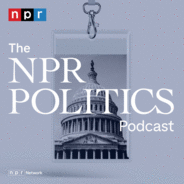A court case has some voters with disabilities worried that they will not be able to rely on family or caretakers for help casting a vote without breaking the law, despite federal protections. This episode: White House correspondent Scott Detrow, political reporter Barbara Sprunt, and voting reporter Miles Parks.Support the show and unlock sponsor-free listening with a subscription to The NPR Politics Podcast Plus. Learn more at plus.npr.org/politics Connect:Email the show at nprpolitics@npr.orgJoin the NPR Politics Podcast Facebook Group.Subscribe to the NPR Politics Newsletter.Find and support your local public radio station.Learn more about sponsor message choices: podcastchoices.com/adchoicesNPR Privacy Policy

Politik
The NPR Politics Podcast Folgen
Every weekday, NPR's best political reporters are there to explain the big news coming out of Washington and the campaign trail. They don't just tell you what happened. They tell you why it matters. Every afternoon.Political wonks - get wonkier with The NPR Politics Podcast+. Your subscription supports the podcast and unlocks a sponsor-free feed. Learn more at plus.npr.org/politics
Folgen von The NPR Politics Podcast
1750 Folgen
-
Folge vom 24.05.2022Voters With Disabilities Worry About Their Ability To Cast Ballots In Wisconsin
-
Folge vom 23.05.2022Biden Visits South Korea And Japan, Emphasizing Trade To Counter ChinaPresident Biden said the U.S. Military would defend Taiwan if China invaded. He also announced a new, if nebulous, economic compact with 12 nations designed to counter China's influence in the region — an echo of the major Trans-Pacific Partnership trade agreement negotiated by the Obama administration and nixed by former president Trump.This episode: White House correspondent Scott Detrow, White House correspondent Asma Khalid, and national political correspondent Mara Liasson.Support the show and unlock sponsor-free listening with a subscription to The NPR Politics Podcast Plus. Learn more at plus.npr.org/politics Connect:Email the show at nprpolitics@npr.orgJoin the NPR Politics Podcast Facebook Group.Subscribe to the NPR Politics Newsletter.Find and support your local public radio station.Learn more about sponsor message choices: podcastchoices.com/adchoicesNPR Privacy Policy
-
Folge vom 20.05.2022Weekly Roundup: May 20thU.S. government tariffs and Department of Agriculture buying practices helped drive consolidation in the baby formula industry. When a major plant shuttered over contamination concerns in February, the industry was already vulnerable to supply chain threats.And after decades of reluctance, Finland and Sweden now hope to join NATO, the U.S.-Europe military alliance founded to protect against possible Russian aggression. The change in stance was prompted by Vladimir Putin's invasion of Ukraine.This episode: White House correspondent Scott Detrow, chief economics correspondent Scott Horsley, congressional correspondent Kelsey Snell, and white House correspondent Franco Ordoñez.Support the show and unlock sponsor-free listening with a subscription to The NPR Politics Podcast Plus. Learn more at plus.npr.org/politics Connect:Email the show at nprpolitics@npr.orgJoin the NPR Politics Podcast Facebook Group.Subscribe to the NPR Politics Newsletter.Find and support your local public radio station.Learn more about sponsor message choices: podcastchoices.com/adchoicesNPR Privacy Policy
-
Folge vom 19.05.2022Will Threats To Abortion Access Motivate Democratic Voters? Maybe.The leak of a draft opinion from the Supreme Court earlier this month that showed the majority-conservative court ready to overturn Roe v. Wade has led two-thirds of Democrats to say that they are more likely to vote in November, according to the latest NPR/PBS NewsHour/Marist poll. That compares to just 40% of Republicans who said so. It remains to be seen whether that enthusiasm will wane in the months before the election.This episode: White House correspondent Scott Horsley, demographics and culture correspondent Danielle Kurtzleben, and senior political editor and correspondent Domenico Montanaro.Support the show and unlock sponsor-free listening with a subscription to The NPR Politics Podcast Plus. Learn more at plus.npr.org/politics Connect:Email the show at nprpolitics@npr.orgJoin the NPR Politics Podcast Facebook Group.Subscribe to the NPR Politics Newsletter.Find and support your local public radio station.Learn more about sponsor message choices: podcastchoices.com/adchoicesNPR Privacy Policy
